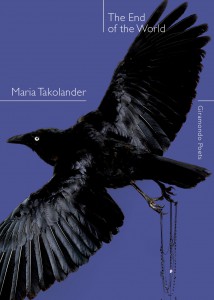 Following the success of her first collection of short stories in 2013, The Double, Australian poet Maria Takolander has returned to poetry in the form of the The End of the World, published by Giramondo Press.
Following the success of her first collection of short stories in 2013, The Double, Australian poet Maria Takolander has returned to poetry in the form of the The End of the World, published by Giramondo Press.
The volume is separated into three highly distinct parts, so distinct, in fact, one feels as though they are pulled from entirely divergent times and mind spaces in Takolander’s life. Part One is overwhelmingly concerned with childbirth, and employs confronting language, occasionally bordering on the grotesque, to explore this journey. The opening poem, ‘Morning Sickness’, is brutal, ugly, and unseemly.
As the title suggests, The End of the World deals with exploring the every day as a series of apocalyptic events. The extended metaphor of motherhood is omnipresent: ‘a caesarean section of the immaculate sky/and we were poised: twenty-something, marble limbed/there were no membranous hollows in skulls/darkly sealing’.
In Part Two, Takolander’s past comes to the fore, as she delves into passages of Finnish history, of which her family was a part — they were exiled from Eastern Finland during World War II. Questions of common inter-generational preoccupations, such as the burden of memory and quest for identity, are tightly explored. In ‘Missing in Action’, she poignantly, but with the stoic distance of a newspaper obituary, describes the specific, tragic fates that befell her displaced relatives.
Part Three, although at times delightful in its absurdity, is not grounded enough for me to respond to it on the same deep levels as I did in Parts One and Two. Poems describing the marital situation between two donkeys, or a goat on a fishing expedition, are hard to follow. However, there are stand outs, such as ‘Why Nuns are Holy’, which humorously explains that: ‘nuns are garrulous/they take their language/surgeon like/from a steel tray/and are truly grateful’.
Takolander has a great talent for both short and long lines. One page might have a stream of six-word stanzas, punching and tough, and the next has softer, drawn-out lines, that lie flat like horizons. Takolander surprises yet again when, two-thirds of the way into The End of the World, she introduces paragraphs; flash-fiction style stanzas that read like the middle of some strange novel.
Displaying restraint and intrigue, daring and bewilderment, Takolander’s The End of the World is not a volume to be missed.
Bio
Louise Jaques is an emerging poet and her piece, ‘Synaesthesia’, was recently published in the 28th UTS Writers’ Anthology, ‘Sight Lines’.
